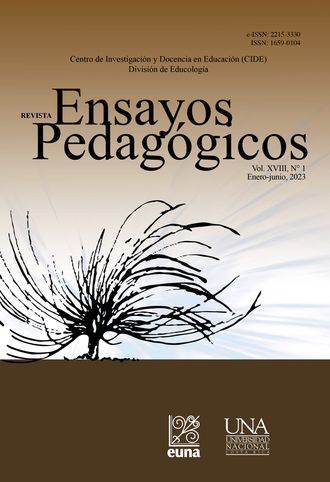Third Cycle of General Basic and Diversified Academic Costa Rican Education: A Comparative Analysis of their Curricular Structures from the Viewpoint of Inclusion, Exclusion, and Educational Inequality
DOI:
https://doi.org/10.15359/rep.18-1.10Keywords:
basic general education, curricular analysis, diversified education, exclusion, inclusion, inequalityAbstract
Within the framework of the research activity carried out from the program Profiles, Dynamics and Challenges of Costa Rican Education from CIDE, Universidad Nacional, Costa Rica, a comparative study was conducted among the different socio-educational factors and inclusion-exclusion actions present in the secondary educational level at a national scope. As a result, a description of the conformation of the public education system was made and the study plans are analyzed taking as a reference the provisions of the Ministry of Public Education and in the document called Compendium of Offers and Services of the Costa Rican Educational System 2016. For the analysis, an assessment of the curricular characteristics was carried out, in terms of subjects and number of lessons, of each curricular plan and the description of each of them was compared using the study plan of traditional academic schools as a point of reference. The main goal of doing this analysis was to identify whether the different curricular proposals could generate inclusion, exclusion, and educational inequality from the student training processes on the Costa Rican public education subject curricula.
References
Conejo, L. y Rodríguez, M. (2022). Desigualdad educativa en el ingreso a las universidades públicas en Costa Rica con acceso restricto y brecha entre modalidades de colegios. Análisis de los resultados de los indicadores técnicos (Nota de colegio y prueba de aptitud académica). Caso de la Universidad Nacional [manuscrito no publicado]. Proyecto Perfiles, Dinámicas y Desafíos de la Educación Costarricense, Universidad Nacional.
Constitución Política de la República de Costa Rica. Artículo 77. 7 de noviembre de 1949. https://www.pgrweb.go.cr/scij/Busqueda/Normativa/Normas/nrm_texto_completo.aspx?nValor1=1&nValor2=871
Guerrero-Castañeda, R. F., Lenise, M. y Ojeda-Vargas, M. G. (2018). Reflexión crítica epistemológica sobre métodos mixtos en Investigación de Enfermería. Enfermería Universitaria, 13(4), 246-252. https://doi.org/10.1016/j.reu.2016.09.001
Hernández, R., Fernández, C. y Baptista, M. (2014). Metodología de la investigación. Mc Graw Hill.
Ley 2160 de 1957. Ley Fundamental de Educación del 25 de setiembre de 1957. http://www.pgrweb.go.cr/scij/Busqueda/Normativa/Normas/nrm_texto_completo.aspx?param1=NRTC&nValor1=1&nValor2=31427&nValor3=33152&strTipM=TC
Ministerio de Educación Pública (MEP). (2017). Compendio de ofertas y servicios del sistema educativo costarricense. https://docplayer.es/85140820-Compendio-costarricense-de-ofertas-y-servicios-del-sistema-educativo.html
Quirós, G. y Rosabal, S. (2022). Génesis y evolución de las modalidades y ofertas educativas en la educación media: una aproximación a la diversidad de posibilidades formativas que brinda el Ministerio de Educación Pública en Costa Rica [manuscrito no publicado]. Proyecto Perfiles, Dinámicas y Desafíos de la Educación Costarricense, Universidad Nacional.
Reygadas, L. (2004). Las redes de la desigualdad: un enfoque multidimensional. Política y Cultura, 22, 7-25. https://www.redalyc.org/articulo.oa?id=26702202
Viceministerio Académico y la Dirección de Desarrollo Curricular del Departamento de Tercer Ciclo y Educación Diversificada. (s. f.). Oferta Curricular de Tercer Ciclo y Educación Diversificada.
Published
How to Cite
Issue
Section
License
Ensayos Pedagógicos is subscribed to the Attribution-NonCommertial-NoDerivatives 4.0 International Creative Commons Licence, which allows both authors and readers to freely download, store, copy, and distribute the final approved publisehd version of the manuscript (post-print) as long as this is done without commercial purposes, no derivative works are generated, and the source and author are mentioned. As well, Ensayos Pedagógicos declares that authors will remain the rightful owners of the copyrights of their work in perpetuity.







